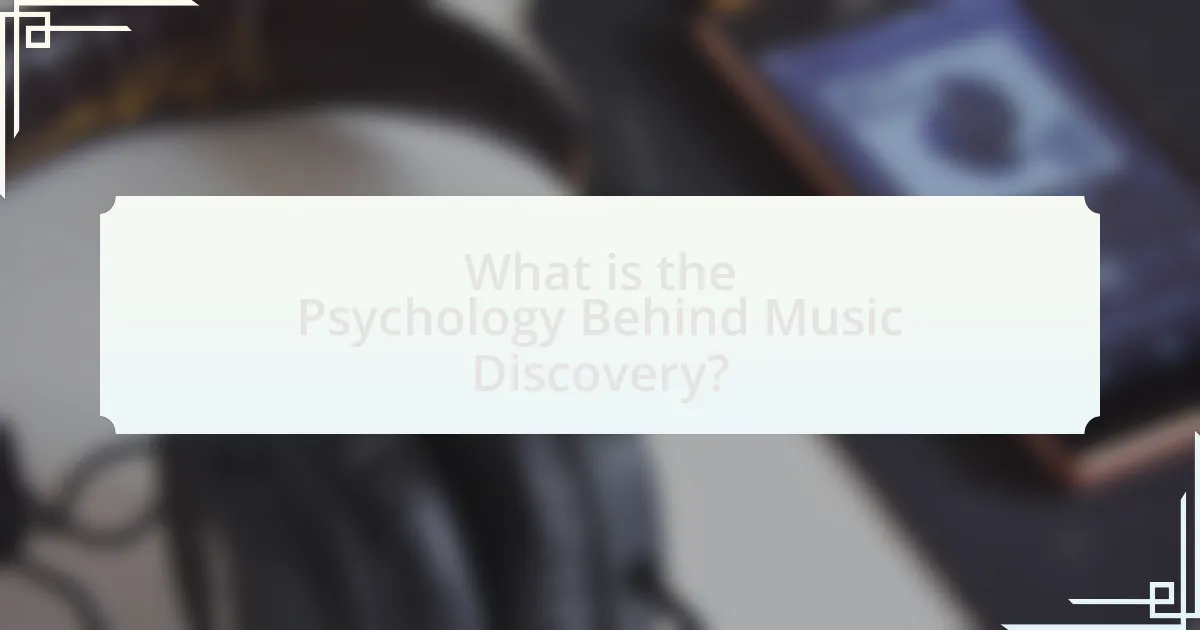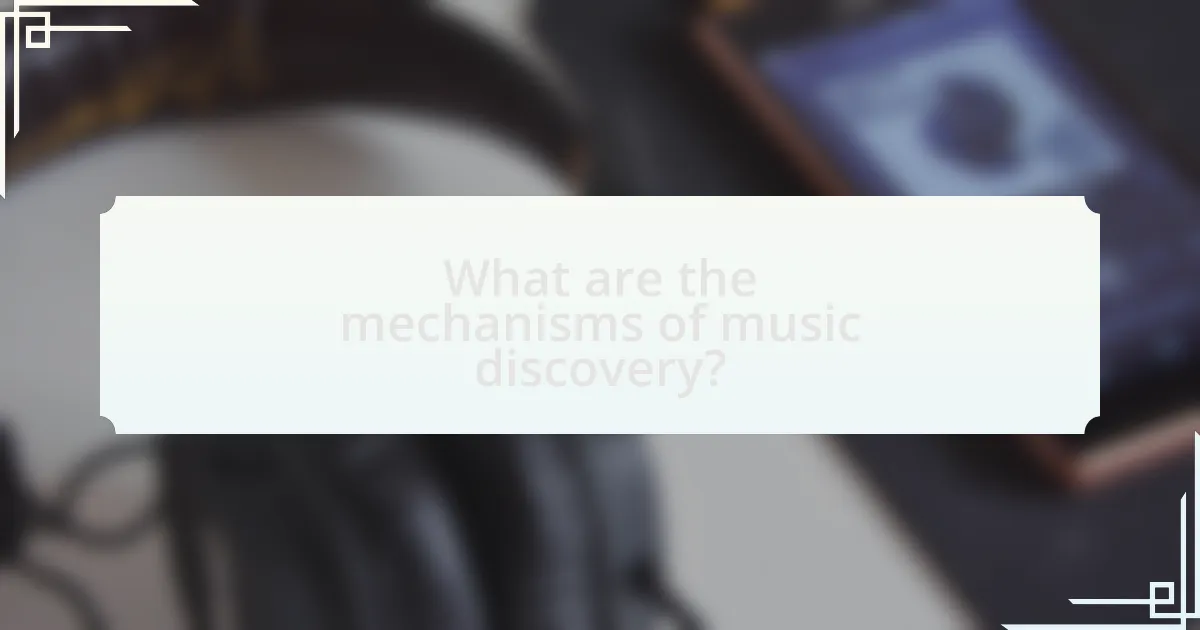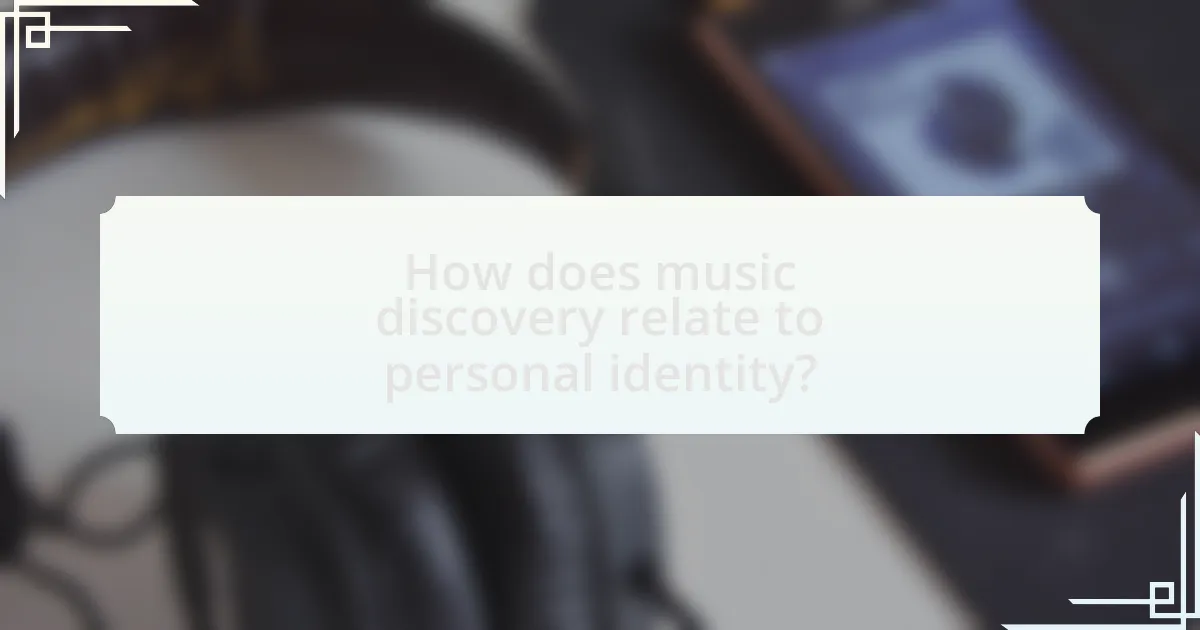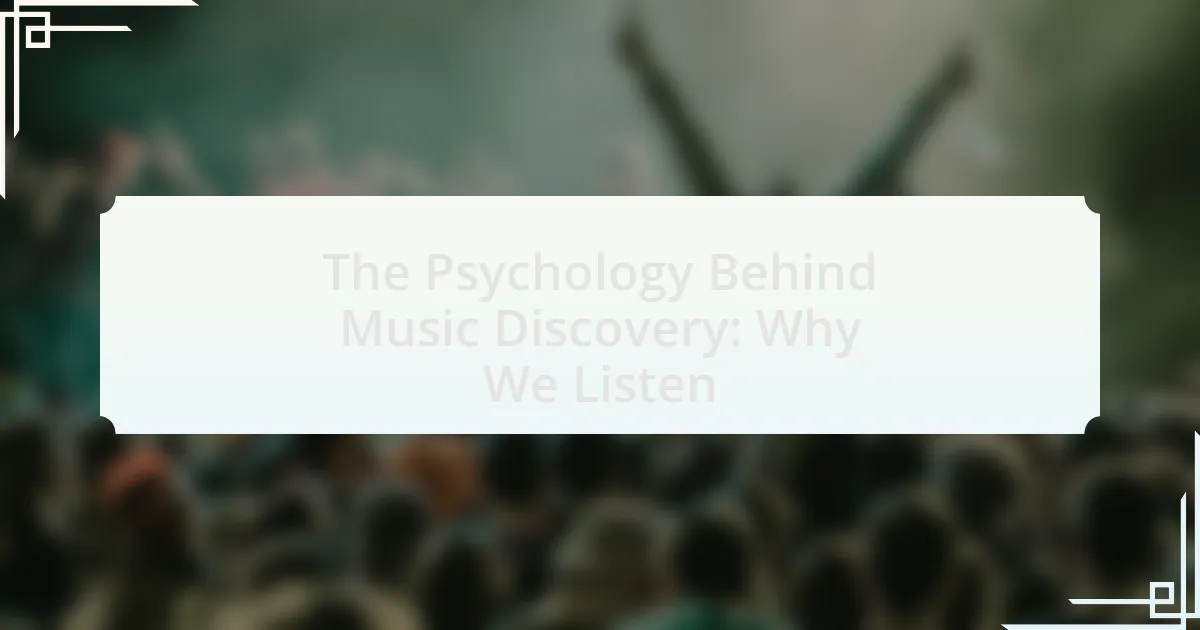The article explores the psychology behind music discovery, examining the cognitive and emotional processes that influence how individuals find and engage with new music. Key factors such as familiarity, social influence, emotional resonance, and curiosity are discussed, highlighting their roles in shaping music preferences and listening habits. The article also delves into the mechanisms of music discovery, including algorithms, social recommendations, and curated playlists, and their impact on user engagement. Additionally, it addresses how music discovery relates to personal identity and cultural expression, emphasizing the significance of emotional connections and social interactions in the music exploration process.

What is the Psychology Behind Music Discovery?
The psychology behind music discovery involves the cognitive and emotional processes that influence how individuals find and engage with new music. Research indicates that factors such as familiarity, social influence, and emotional resonance play significant roles in music discovery. For instance, studies show that people are more likely to explore music that is similar to what they already enjoy, a phenomenon known as the “mere exposure effect,” which suggests that repeated exposure to certain music increases preference for it. Additionally, social connections, such as recommendations from friends or social media, significantly impact music discovery, as individuals often trust the tastes of their peers. Emotional responses to music, including nostalgia or mood enhancement, also drive listeners to seek out new tracks that evoke similar feelings. These psychological mechanisms collectively shape the way individuals discover and appreciate music.
How does music discovery influence our listening habits?
Music discovery significantly influences our listening habits by expanding our exposure to diverse genres and artists, which can lead to increased engagement and preference for new music. Research indicates that platforms like Spotify and Apple Music utilize algorithms that recommend songs based on user behavior, effectively shaping listening patterns. A study by the University of Southern California found that personalized recommendations can increase the likelihood of users exploring unfamiliar music, thereby altering their overall listening preferences and habits. This shift in exposure not only enhances the variety of music consumed but also fosters a deeper emotional connection to different styles and cultures.
What psychological factors drive our music preferences?
Psychological factors that drive our music preferences include personality traits, emotional responses, and social influences. Research indicates that individuals with higher openness to experience tend to prefer more complex music genres, such as jazz or classical, while those with lower openness may favor simpler, more mainstream genres. Additionally, music evokes emotional responses that can be tied to personal experiences, leading listeners to gravitate towards songs that resonate with their feelings or memories. Social influences, such as peer groups and cultural background, also play a significant role in shaping music preferences, as individuals often align their tastes with those of their social circles to foster connection and belonging. Studies, such as those published in the Journal of Personality and Social Psychology, highlight these correlations, demonstrating that both intrinsic and extrinsic factors significantly impact our musical choices.
How do emotions affect our music discovery process?
Emotions significantly influence our music discovery process by shaping our preferences and guiding our choices. When individuals experience specific emotions, they tend to seek out music that resonates with those feelings, either to amplify or alleviate their emotional state. For instance, research published in the journal “Emotion” by Saarikallio and Erkkilä (2007) indicates that people often use music as a tool for emotional regulation, leading them to discover new genres or artists that align with their current mood. This emotional connection to music not only enhances the discovery experience but also fosters a deeper engagement with the music itself, as listeners are more likely to remember and revisit songs that evoke strong emotional responses.
Why do we seek out new music?
We seek out new music primarily to fulfill our innate curiosity and desire for novelty. This pursuit is driven by psychological factors such as the need for stimulation and emotional connection. Research indicates that exposure to new music can activate the brain’s reward system, releasing dopamine, which enhances pleasure and satisfaction. Additionally, studies show that discovering new music can foster social connections and cultural engagement, as individuals often share their findings with others, reinforcing social bonds.
What role does curiosity play in music exploration?
Curiosity drives music exploration by motivating individuals to seek out new sounds, genres, and artists. This intrinsic desire to discover fosters a deeper engagement with music, leading to a broader understanding of cultural and emotional contexts. Research indicates that curiosity enhances learning and retention, as seen in studies where individuals exposed to diverse musical styles reported increased enjoyment and appreciation for music overall. For instance, a study published in the journal “Psychology of Music” by Hargreaves and North found that curiosity significantly influences listeners’ willingness to explore unfamiliar music, thereby enriching their musical experience.
How does social influence shape our music choices?
Social influence significantly shapes our music choices by affecting our preferences and listening habits through social interactions and cultural contexts. Research indicates that individuals often align their music tastes with those of their peers to foster social connections and acceptance. For instance, a study published in the journal “Psychology of Music” by North and Hargreaves (2007) found that people are more likely to enjoy music that is popular within their social circles, demonstrating the impact of social validation on music preferences. Additionally, social media platforms amplify this effect by exposing users to trending songs and artists, further reinforcing collective music choices.

What are the mechanisms of music discovery?
The mechanisms of music discovery include algorithms, social recommendations, and personal exploration. Algorithms, such as those used by streaming services like Spotify, analyze user behavior and preferences to suggest new music tailored to individual tastes. Social recommendations leverage the influence of friends and social networks, where users discover music through shared playlists and recommendations. Personal exploration involves active searching by users, often driven by curiosity or specific moods, leading them to discover new genres or artists. Research indicates that 70% of listeners find new music through algorithmic recommendations, highlighting the significant role of technology in music discovery.
How do algorithms impact our music discovery experience?
Algorithms significantly enhance our music discovery experience by personalizing recommendations based on user behavior and preferences. Streaming platforms like Spotify and Apple Music utilize complex algorithms that analyze listening history, song attributes, and user interactions to curate playlists and suggest new tracks. For instance, Spotify’s Discover Weekly playlist is generated using collaborative filtering and natural language processing, which considers millions of user data points to identify patterns and predict what users might enjoy. This tailored approach not only increases user engagement but also exposes listeners to a broader range of music, often leading to the discovery of new artists and genres that align with their tastes.
What are the key features of music recommendation systems?
Music recommendation systems primarily feature personalized algorithms that analyze user preferences and behaviors to suggest relevant music. These systems utilize collaborative filtering, which examines user interactions and similarities among users to recommend tracks that others with similar tastes have enjoyed. Additionally, content-based filtering is employed, where the system analyzes the attributes of songs, such as genre, tempo, and instrumentation, to match them with user preferences.
Another key feature is the integration of contextual data, including time of day, location, and user mood, which enhances the relevance of recommendations. Furthermore, machine learning techniques are increasingly used to improve the accuracy of recommendations by continuously learning from user feedback and interactions. These features collectively enhance user engagement and satisfaction, making music discovery more intuitive and enjoyable.
How do user interactions enhance music discovery algorithms?
User interactions enhance music discovery algorithms by providing valuable data that informs personalization and recommendation processes. When users engage with music through actions such as listening, liking, sharing, or skipping tracks, these interactions generate insights into their preferences and behaviors. For instance, platforms like Spotify utilize collaborative filtering techniques, which analyze user interactions to identify patterns and similarities among listeners, thereby improving the accuracy of music recommendations. Research indicates that personalized recommendations can increase user engagement by up to 30%, demonstrating the effectiveness of leveraging user interactions in refining algorithmic outputs.
What role do playlists and curators play in music discovery?
Playlists and curators significantly enhance music discovery by organizing and recommending tracks that align with listeners’ preferences. Curators, often experts or influencers in the music industry, create playlists that introduce audiences to new artists and genres, thereby expanding their musical horizons. For instance, Spotify’s algorithm-driven playlists, such as Discover Weekly, utilize user data to suggest songs tailored to individual tastes, resulting in a 40% increase in streams for featured tracks. This demonstrates that curated playlists not only facilitate exposure to diverse music but also drive engagement and consumption in the streaming landscape.
How do curated playlists affect our music choices?
Curated playlists significantly influence our music choices by shaping our exposure to new artists and genres. These playlists, often created by algorithms or music experts, present a selection of tracks that align with listeners’ preferences, thereby guiding their listening habits. Research indicates that 70% of users discover new music through curated playlists on streaming platforms, highlighting their role in music discovery. This exposure can lead to increased engagement with specific genres or artists, as listeners are more likely to explore songs that are recommended to them, reinforcing their musical preferences and expanding their overall taste.
What is the significance of user-generated content in music discovery?
User-generated content is significant in music discovery because it enhances engagement and personalization, allowing listeners to find music that resonates with their tastes. Platforms like Spotify and YouTube leverage user-generated playlists, reviews, and recommendations, which contribute to algorithmic suggestions and create a community-driven approach to music exploration. Research indicates that 79% of consumers say user-generated content highly impacts their purchasing decisions, highlighting its influence in shaping music preferences and trends. This collaborative environment fosters a sense of belonging and encourages users to explore diverse genres and artists, ultimately enriching the music discovery experience.

How does music discovery relate to personal identity?
Music discovery significantly influences personal identity by shaping individual preferences, values, and social connections. As individuals explore new genres and artists, they often align their musical tastes with their self-concept and social identity, reflecting their beliefs and experiences. Research indicates that music serves as a tool for self-expression and identity formation; for instance, a study published in the journal “Psychology of Music” by North and Hargreaves (2006) found that people often use music to communicate aspects of their identity to others. This connection between music and identity is further reinforced by the social context in which music is consumed, as shared musical experiences can strengthen group identity and foster a sense of belonging.
In what ways does music reflect our personal experiences?
Music reflects our personal experiences through emotional resonance, cultural identity, and memory association. Emotional resonance occurs when specific melodies or lyrics evoke feelings that align with individual life events, such as joy, sadness, or nostalgia. For instance, studies show that people often choose songs that mirror their current emotional state, reinforcing their feelings and providing comfort. Cultural identity is reflected in music through genres and styles that resonate with an individual’s background, allowing them to express their heritage and connect with others who share similar experiences. Additionally, music is closely tied to memory; research indicates that songs can trigger vivid recollections of past events, enhancing the emotional impact of those memories. This interplay between music and personal experiences illustrates how deeply intertwined they are, shaping our identities and emotional landscapes.
How does music discovery contribute to self-expression?
Music discovery enhances self-expression by allowing individuals to explore diverse genres and artists that resonate with their personal experiences and emotions. This exploration enables listeners to curate playlists and select songs that reflect their identity, beliefs, and feelings, thereby facilitating a deeper connection to their own self-concept. Research indicates that music serves as a powerful tool for emotional regulation and identity formation; for instance, a study published in the Journal of Personality and Social Psychology found that individuals often use music to express their mood and reinforce their self-image. Consequently, the act of discovering new music not only broadens one’s auditory palette but also empowers individuals to articulate their unique perspectives and emotions through their musical choices.
What is the connection between music and cultural identity?
Music serves as a vital expression of cultural identity, reflecting the values, traditions, and experiences of a community. It acts as a medium through which individuals connect with their heritage, fostering a sense of belonging and continuity. For instance, ethnomusicological studies demonstrate that specific musical styles, such as traditional folk music, are deeply intertwined with cultural narratives and rituals, reinforcing group identity. Additionally, research indicates that music preferences often align with cultural backgrounds, influencing social interactions and community cohesion. This connection underscores the role of music not only as entertainment but also as a fundamental component of cultural identity formation and preservation.
How can understanding music discovery enhance our listening experience?
Understanding music discovery enhances our listening experience by enabling listeners to find new genres, artists, and songs that align with their preferences, thereby broadening their musical horizons. This process is facilitated by algorithms and platforms that analyze listening habits, which can lead to the discovery of music that resonates on emotional and cognitive levels. Research indicates that exposure to diverse music can improve mood and cognitive function, as seen in studies showing that varied musical experiences can stimulate brain activity and enhance emotional well-being. By actively engaging in music discovery, listeners can cultivate a richer, more personalized auditory experience that fosters deeper connections to the music they enjoy.
What strategies can we use to discover music that resonates with us?
To discover music that resonates with us, we can utilize personalized streaming algorithms, explore curated playlists, and engage with music communities. Personalized streaming algorithms, such as those used by Spotify and Apple Music, analyze listening habits to recommend songs that align with individual tastes, enhancing the likelihood of finding music that resonates. Curated playlists, often created by music experts or based on specific moods and genres, provide a focused selection of tracks that can introduce listeners to new artists and songs that match their preferences. Engaging with music communities, whether online or in-person, allows individuals to share recommendations and discover music through social interactions, which can lead to finding tracks that deeply connect with personal experiences and emotions.
How can we leverage technology for better music discovery?
We can leverage technology for better music discovery by utilizing algorithms and data analytics to personalize recommendations. Streaming platforms like Spotify and Apple Music employ machine learning algorithms that analyze user listening habits, preferences, and trends to suggest new music tailored to individual tastes. Research indicates that personalized recommendations can increase user engagement by up to 30%, as users are more likely to explore music that aligns with their established preferences. Additionally, social media integration allows users to discover music through peer recommendations, enhancing the overall discovery experience.
What are practical tips for effective music discovery?
To effectively discover music, utilize streaming platforms’ algorithms, explore curated playlists, and engage with music communities. Streaming services like Spotify and Apple Music use data-driven algorithms to recommend songs based on listening habits, which can lead to discovering new artists and genres. Curated playlists, often created by music experts or influencers, provide a selection of tracks that can introduce listeners to emerging music trends. Engaging with music communities on social media platforms or forums allows users to share recommendations and discover hidden gems through peer suggestions. These methods leverage technology and social interaction to enhance music discovery.

Leave a Reply